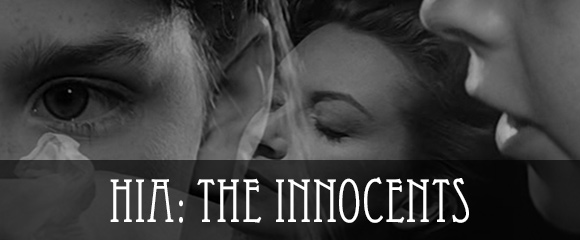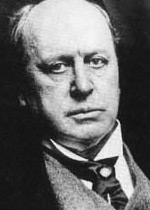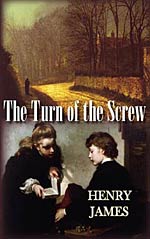Hell Is Adaptations: The Innocents

Only make the reader’s general vision of evil intense enough, I said to myself . . . and his own experience, his own imagination, his own sympathy (with the children) and horror (of their false friends) will supply him quite sufficiently with all the particulars. Make him think the evil, make him think it for himself, and you are released from weak specifications.
—Henry James, 1908 Preface to the New York Edition of The Turn of the Screw
In considering which genre film adaptations to take a look at for WWEnd’s new blog series, I thought I’d begin with that most unusual case—a successful film adaptation of one of my favorite novels; one that manages to respect the original story while using the tools of cinema to elucidate that story in ways not possible on the printed page. Instead of nitpicking the alterations from print to screen and wondering what in the world the filmmakers were thinking (which, unfortunately, tends to be my response to film adaptation of novels I admire, more often than not), upon re-watching The Innocents, the 1961 adaptation of Henry James’s The Turn of the Screw, I found myself admiring the ways in which the filmmakers had added their own touches to the story, indicating a real understanding of the essential ambiguity that defines The Turn of the Screw, while not merely giving the audience a slavish recreation of the original.
Month of Horrors: The Turn of the Screw
 Science Fiction and Fantasy have done a little genre merging of late. Our tech has become a little more fantastic and our magic more technical. Steampunk has crossed over into the mainstream of fandom, kindling a new interest in the 19th century, in particular. Steampunk may be new, but it’s also old. In those heady days of the late 1800s, science fiction was in its infancy, and fantasy wasn’t selling. The hot genre was the ghost story — one of the founding fathers of modern horror.
Science Fiction and Fantasy have done a little genre merging of late. Our tech has become a little more fantastic and our magic more technical. Steampunk has crossed over into the mainstream of fandom, kindling a new interest in the 19th century, in particular. Steampunk may be new, but it’s also old. In those heady days of the late 1800s, science fiction was in its infancy, and fantasy wasn’t selling. The hot genre was the ghost story — one of the founding fathers of modern horror.
One of the great ghost stories is Henry James‘ classic, The Turn of the Screw. Published in 1898, just before the turn the of the century, James’ novel tapped into the freewheeling scientific inquiry of the time. The notion of "spiritual phenomena" was considered scientific and quite legitimate. Many intellectuals of the day professed a belief in ghosts, and séances were all the rage. Yet James approached his ghosts in a way that was as mysterious as the apparitions themselves. The ghosts in The Turn of the Screw are only ever witnessed by one character, and the veracity of her narration is sometimes in doubt. The brother of William James (a famous psychologist), Henry was the first to psychologize the notion of ghosts. The reader is free to suppose the shadowy figures as the delusion of an insane nanny, yet not comfortably. The ghosts themselves never seem to really interact with the world, but, instead, beckon their victims to harm themselves, again leaving room for interpretation. This is, perhaps, why the novella has survived as well as it has (certainly longer than the "science" of spiritualism) — because the ghosts live only in the corner of the reader’s eye. Examine a phenomenon like this too closely, and it vanishes.
 The story is the first in a long line of psychological thrillers that have you doubting what you are seeing. Although it isn’t the first of the ghost story genre (Homer, Shakespeare, Dickens all came before), it is possibly the most copied in modern storytelling. After reading The Turn of the Screw, you’ll see subtle homages (intended or unintended) in films like Inception, where the unreliable nature of the human mind is writ large. Life on Mars also comes to mind: "Am I mad, in a coma, or back in time!" The novella even appeared several times in the series Lost, as a clue to eery happenings to come (even after the finale, many Losties were left wondering what was real).
The story is the first in a long line of psychological thrillers that have you doubting what you are seeing. Although it isn’t the first of the ghost story genre (Homer, Shakespeare, Dickens all came before), it is possibly the most copied in modern storytelling. After reading The Turn of the Screw, you’ll see subtle homages (intended or unintended) in films like Inception, where the unreliable nature of the human mind is writ large. Life on Mars also comes to mind: "Am I mad, in a coma, or back in time!" The novella even appeared several times in the series Lost, as a clue to eery happenings to come (even after the finale, many Losties were left wondering what was real).
Horror, at its best, tortures not just its characters, but its audience. If you decide to read this one, be prepared to have the screws turned on you.



















 Full Details
Full Details

